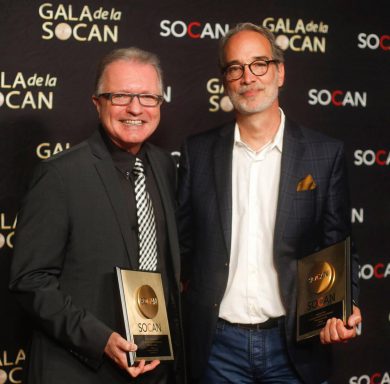He’s officially Vice-President of Publishing for Anthem Entertainment, “but people call me The Ambassador,” says Gilles Godard. This Franco-Ontarian, who began his career as a country singer-songwriter, is now one of Canada’s most influential publishers worldwide, and his position allows him to introduce local writers and composers to the American music industry.

Gilles Godard and Raymond Fabi, composer of the music for the youth TV series Arthur after winning the Music for Television (National) Award – Youth Award at the 2019 Montréal SOCAN Awards Gala. (Photo: Frédérique Ménard-Aubin)
Wednesday, Nov. 20, 2019, was a good day for Godard and Anthem. That morning, the American Academy of Recording Arts & Sciences announced the nominees for the 62nd edition of the Grammy Awards that will take place on Jan. 26, 2020, at the Staples Center in Los Angeles. The rap-pop sensation of the moment, rapper and singer Lizzo, is at the head of the pack with eight nominations – thanks to the immense success of her song “Truth Hurts,” from her third album, Cuz I Love You.
“Recently, we bought two catalogues, one with several Lizzo hits, and the other composed of hits by The Weeknd,” says Godard. These are catalogues that belong to the Boardwalk Music Group, which represents the American composer and producer Ricky Reed, who co-wrote “Truth Hurts.” Bingo! Godard and his team are nominated for four Grammys: Recording, Albumr, Solo Pop Performance, and Song of the Year. Not to mention the possibility that country star Reba McEntire wins the Country Album of the Year trophy. “I think it’ll be a good year for us at the Grammys,” say the publisher, whose company (formely ole Media Management) has won several trophies over the last few years thanks to hits by Taylor Swift and Beyoncé, among others.
Godard is even prouder because he considers his company’s structure as “independent” compared to the other big players of the publishing world. “We’re smaller and more agile, but well financed, in the end,” he says. “I believe we still have an independent mind-set, which gives us an edge,” says the Anthem VP, who moved to Nashville in the late ’80s.
Before becoming a music publisher, the Cornwall, Ontario-born ambassador was a successful country singer-songwriter, who launched his eponymous debut album on his own label, Book Shop. He started as an Anglophone artist, but he released a Francophone album, En amour, which won the ADISQ Country Album of the Year Félix award in 1987, before moving to Nashville to write songs for several American country artists.
“I’ve always loved music, but winning that Félix – as a producer and an artist – gave me the opportunity to work with many artists,” he says, and from that point on, he learned the ropes of the music business. “I’m lucky to have had the chance to transition from songwriter to publisher and producer, and I’m still active as a songwriter, even though I’m more often than not a publisher,” says Godard. “It helps me understand the reality of artists—I’m not just a producer; I listen to what songwriters have to say.”
“Television and the movies are the new radio. The field of synchronization is exceptional right now.”
By that he means songwriters from Québec, and the rest of Canada, among others. That’s why he is nicknamed The Ambassador. Godard offers them priceless contact with the American industry, and he doesn’t hesitate to introduce local producers and artists to his vast network. “Do you know Tebey?” he asks. “He recorded a duet with Marie-Mai, ‘The Good Ones.’ It’s through him that I met her team, and right now, we’re connecting Marie-Mai with our team of songwriters in the pop-urban-hip-hop division in Los Angeles.”
After more than 25 years in the publishing world, Godard has a very clear perspective on the evolution of the industry, especially the critical role of publishers. “Publishers have evolved to become somewhat A&R types,” he says, referencing talent scouts for record labels. “We’re on the lookout for, and sign, young songwriters we believe in, and introduce them to talented musicians and artists. And we work really hard to propel their careers.”
The other agent of change, obviously, is the digital revolution – for better or worse – as it affects royalties paid to songwriters. “We often say that television and the movies are the new radio,” says Godard. “The field of synchronization is exceptional right now.” That’s thanks to the new opportunities songwriters have to see their songs used in screen productions. For Godard, that’s the only “fair trade” in the music industry. “The songwriter who owns the copyright receives half of the royalties, and the owner of the masters receives the other half,” he says. “For the past five years, those royalties have experienced strong growth thanks to the video streaming platforms.”
But the low amount of royalties earned by songs played online remains, as Pierre Lapointe pointed out during the recent ADISQ gala. On this issue, the publisher is on the side of songwriters. “These companies couldn’t exist if their platforms didn’t have access to all those songs, so it’s unfair [that the royalties are so meager],” he says. “Those rates will need to be adjusted, and I think a change is coming, because things can’t remain as they are now.”
Do publishers have any clout in this debate? Could a collaboration between the major publishers to put pressure on the music streaming sites of the world become a reality? “Yes,” Godard says, “and I think it’ll happen one day. Our lawyers are very active, and discuss this question with lawmakers to make them understand that if things don’t change, there’ll be no money left to make [in songwriting]. Things need to change, because some players make money and don’t fairly compensate the creators.”
To be continued…